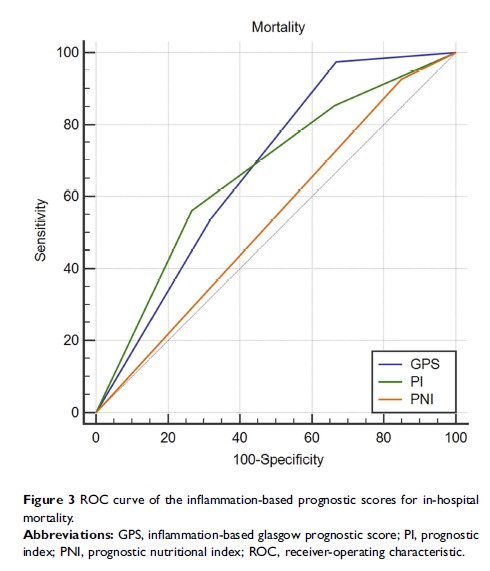9 1 2 3 6
论文已发表
注册即可获取德孚的最新动态
IF 收录期刊
- 2.6 Breast Cancer (Dove Med Press)
- 3.9 Clin Epidemiol
- 3.3 Cancer Manag Res
- 3.9 Infect Drug Resist
- 3.6 Clin Interv Aging
- 4.8 Drug Des Dev Ther
- 2.8 Int J Chronic Obstr
- 8.0 Int J Nanomed
- 2.3 Int J Women's Health
- 3.2 Neuropsych Dis Treat
- 4.0 OncoTargets Ther
- 2.2 Patient Prefer Adher
- 2.8 Ther Clin Risk Manag
- 2.7 J Pain Res
- 3.3 Diabet Metab Synd Ob
- 4.3 Psychol Res Behav Ma
- 3.4 Nat Sci Sleep
- 1.9 Pharmgenomics Pers Med
- 3.5 Risk Manag Healthc Policy
- 4.5 J Inflamm Res
- 2.3 Int J Gen Med
- 4.1 J Hepatocell Carcinoma
- 3.2 J Asthma Allergy
- 2.3 Clin Cosmet Investig Dermatol
- 3.3 J Multidiscip Healthc

老年急性心肌梗死患者基于炎症的预后评分与住院期间疗效的关系
Authors Wang R, Wen X, Huang C, Liang Y, Mo Y, Xue L
Received 2 May 2019
Accepted for publication 12 June 2019
Published 4 July 2019 Volume 2019:14 Pages 1199—1206
DOI https://doi.org/10.2147/CIA.S214222
Checked for plagiarism Yes
Review by Single-blind
Peer reviewers approved by Dr Bik-Wai Bilvick Tai
Peer reviewer comments 2
Editor who approved publication: Dr Zhi-Ying Wu
Objective: Emerging evidence suggests that systemic inflammation is a predictor of poor prognosis in acute myocardial infarction (AMI). In this study, we sought to assess whether inflammation-based prognostic scores are associated with in-hospital outcomes in elderly patients with AMI.
Methods: In this retrospective study, patients who were over 75-years-old and met the diagnostic criteria for AMI were consecutively recruited from January 1, 2016, to March 31, 2019. Logistic regression and receiver-operating characteristic (ROC) analyses were performed to evaluate the predictive value of the inflammation-based Glasgow Prognostic Score (GPS), Prognostic Index (PI) and Prognostic Nutritional Index (PNI).
Results: A total of 273 patients were enrolled. The incidence of major cardiovascular adverse events (MACEs) and mortality during hospitalization increased significantly with increasing GPS and PI scores. Multiple logistic regression showed that the GPS was independently associated with MACEs (score 1, RR: 6.711, 95% CI: 1.409–31.968; score 2, RR: 14.063, 95% CI: 3.018–65.535) and mortality (score 1, RR: 8.656, 95% CI: 1.068–70.126; score 2, RR: 10.549, 95% CI: 1.317–84.465). The PI was also independently predictive of MACEs (score 2, RR: 5.132, 95% CI: 1.451–18.148). No significant difference was observed in the PNI between patients with different in-hospital outcomes. When in-hospital MACEs were used as an endpoint, the area under the curve (AUC) of the GPS was 0.740 (95% CI 0.678–0.802), and the AUC of the PI was 0.703 (95% CI 0.634–0.773). When mortality was used as an endpoint, the AUC of the GPS was 0.677 (95% CI 0.602–0.753), and the AUC of the PI was 0.667 (95% CI 0.577–0.757).
Conclusion: The severity of systemic inflammation is a strong predictor of poor prognosis in elderly patients with AMI. Among these three inflammation-based prognostic scores, the GPS has a better predictive value than the PI and PNI for in-hospital MACEs and mortality.
Keywords: inflammation-based prognostic scores, acute myocardial infarction, elderly patients
